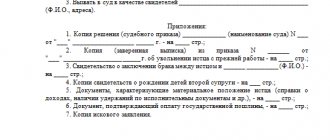Home » Divorce » Divorce without the consent of one of the spouses
20
Is it possible to get a divorce if one spouse does not agree to it? These questions are asked by many couples in which one spouse wants to break off the relationship forever, and the other is determined to preserve the marriage. Such problems are solved in each couple individually, taking into account the circumstances: the presence of common minor children and their age, willingness to make mutual concessions, the possibility of reconciliation.
The right to file for divorce is granted to each spouse, and how successful the process will be depends on compliance with the law and the effectiveness of negotiations.
Features of divorce proceedings without the consent of the spouse
Divorce through the registry office
Registration of a divorce in the presence of children without the consent of the spouse occurs by submitting to an authorized employee of the state registry office the following documents:
- Judgment. It must be submitted to confirm the unknown absence, incapacity or declaration of death of another participant in the marital relationship.
- Death registration certificate. It is issued to the registry office at the place of residence of the deceased if the time and place of his death is reliably known.
- A court verdict sending a spouse to prison for more than 3 years. The interested spouse may obtain a copy of it by petitioning the judicial authority that issued the judgment.
- Application written according to the ninth form. Its sample can be downloaded here.
- Marriage registration document.
- Passport of the interested spouse.
- A document certifying the transfer of money to the state treasury account as payment of state duty.
After receiving official documents, the procedure for severing marital ties at the registry office goes through the following stages:
- An employee of the state registry office names the date for the second visit. It must be within 30 days from the date of the first visit. This time is required to enter information about the dissolution of family relationships into the civil registry book and to prepare a certificate.
- During the second visit, you need to obtain a completed certificate documenting the separation of marriage ties and sign for its receipt. It should be borne in mind that, by law, a marriage is considered terminated from the moment when the relevant information about it appears in the civil records book.
Keep in mind that you can get a divorce on the sole request of your spouse, including in the absence of common children.
In addition, when a marital relationship is unilaterally dissolved, there cannot be a dispute between the spouses about the future place of residence of their common minor children. They will live in residential premises owned by the initiator of the divorce.
A foreigner and a Russian citizen can formalize the termination of family relations unilaterally:
- In the Civil Registry Office of the Russian Federation in accordance with Russian family legislation.
- In a foreign country at consulates and diplomatic institutions of the Russian Federation.
- In the competent authority of a foreign state.
Divorce in court
Divorce cases are handled by 2 types of courts, the competence of which is indicated in the table below.
| Type of judicial body | Jurisdiction of divorce cases |
| World judge | All divorce cases, except cases:
|
| District Court | All claims for the termination of marital relations that cannot be resolved by law by a magistrate. |
According to the jurisdiction, the claims of one of the spouses may be considered:
- In the judicial authorities located at the location of the defendant. Most claims are filed and resolved under this rule.
- In the judicial authorities located at the location of the plaintiff. The law allows the plaintiff to send a claim with additional documents to the court of his city if he cannot travel to the settlement where the defendant lives for proceedings due to a serious illness or supports and raises a minor son or daughter on his own.
- In any judicial authority on the territory of Russia by joint agreement of the parties to the divorce proceedings.
Having resolved the problems of jurisdiction and jurisdiction, the plaintiff should begin preparing the application. It consists of 3 sections:
- A header that contains the name of the judicial authority, the full names of the participants in the process, their addresses and communication data, for example, telephone numbers, faxes, e-mail addresses.
- The descriptive part includes information about: The reasons that prompted the plaintiff to divorce the other spouse.
- The defendant's refusal to dissolve the marital relationship.
- Date and place of registration of marital relations.
- Common children.
- Agreements concluded between husband and wife, for example, on the division of assets, alimony.
- Links to laws.
- List of documents attached to the claim.
After writing the claim, the applicant prepares evidence of the impossibility of continuing family life, and also calculates and pays a fee to the state for the trial.
Then the plaintiff submits the papers he has prepared to the court office, where he is informed of the date of the upcoming trial. As a rule, it will take place within 1 month after submitting the documents.
Usually the case is resolved in 2 meetings:
- At the first meeting, the judge asks the spouses whether they agree to divorce and requests the original of the alimony agreement, as well as the agreement on children and the division of common property. If one of the spouses objects to the separation, the judge sets a period of time not exceeding 3 months and is intended to preserve the marital relationship, as well as to reconcile the wife and husband. The period may be reduced or not assigned at all if the spouses request this in a mutual petition or there are grounds to fear for the life of one of the participants in the marriage relationship.
- Before the start of the second hearing, the judge examines the papers and evidence handed over to him. At the meeting, he asks the spouses whether they have reconciled. If so, he closes the case due to the conclusion of a settlement agreement. If not, then the judge agrees to dissolve the marital relationship. Next, he resolves questions about the amount of alimony allowance, divides marital property and resolves disagreements about the future place of residence of the children.
- The divorce process ends with the issuance of an order by a magistrate, which is endowed by law with legal force 10 days from the moment it is handed over to the defendant and plaintiff, or by a decision by a district court judge, which is given legal force by law 1 month after it is issued in final form.
The law gives the court office 3 days after the decision is given legal force to send by mail extracts from the judicial act to the former spouses and to the state civil registry office.
After receiving the judicial act in hand, both former spouses must prepare the following list of documents before visiting the registry office:
- An application drawn up in your own hand according to the tenth form. A sample can be found here.
- Passport.
- Extract from a court order or decision.
- Marriage certificate.
- A document or receipt confirming payment of a duty to the state treasury.
After receiving the documents, the competent civil registry office employee sets a date for a return visit. He has 30 days to issue a certificate of termination of marriage and give it to his ex-spouse.
Please note that by law, an order or decision with legal force automatically dissolves the marital relationship of the spouses. In this regard, obtaining a certificate from the state civil registry office is necessary so that the former spouses have proof of divorce in front of third parties, for example, employers and government employees.
A foreigner and a Russian citizen can formalize the dissolution of family relations on grounds that require judicial proceedings:
- In the court of the Russian Federation according to the norms of Russian family legislation.
- In the competent authority of a foreign state.
basic information
Dear readers! The article talks about typical ways to resolve legal issues, but each case is individual. If you want to find out how to solve your particular problem , contact a consultant:
+7 (499) 938-81-90 (Moscow)
+7 (812) 467-32-77 (Saint Petersburg)
8 (800) 301-79-36 (Regions)
APPLICATIONS AND CALLS ARE ACCEPTED 24/7 and 7 days a week.
It's fast and FREE !
If the spouse has quite a lot of claims and everything is heading towards divorce, then one of the parties has the right to file an application for divorce proceedings. But the second spouse has the right to disagree with this position and petition to preserve the marriage union.
It is not uncommon for a man to become the initiator, and a woman tries to maintain the relationship, guided by feelings and even sometimes by mercantile considerations.
It is possible to divorce unilaterally, but in compliance with the basic rules.
Divorce is not possible on the part of the husband if there is:
- wife's pregnancy;
- if the child was born no more than a year ago. Even if the child was stillborn or died before this period. As soon as this period has passed, the man has the right to file for divorce.
You can submit an application to the registry office only in certain situations, namely:
- by mutual consent in the absence of joint minor children. If one of the parties does not agree to divorce, then this cannot be done through such an authorized body. After all, this process, like marriage, should be created only with the mutual consent of the parties;
- One of the spouses has the right to unilaterally submit an application, but if the other party is recognized as incompetent, dead, missing, or sentenced for a term of more than three years.
List of documents for divorce without the consent of the spouse
| For the registry office | For the court |
|
|
Application and documents
In all other cases, the rule for filing an application with the court applies. Often this happens when there is no mutual consent, there are children or property disputes.
There is an increased state duty and the possibility of additional claims.
All divorce cases are heard in the Magistrates' Court unless there are additional requirements. If there are any, then the appeal takes place in the district court. In accordance with the basic rules, the application is submitted at the place of residence of the defendant.
If both spouses live together, then no questions can arise.
If the residence is separate, then the spouse will have to independently find out where the defendant is registered and send notices of the divorce action. The application must be filled out correctly and consist of three main parts.
In particular, this is a formal part that contains the name of the court, full name of the applicant and defendant, date of birth and registration data. Next, enter information about children, if any.
The second part is descriptive. This often includes the date of marriage, circumstances, reasons for dissolution, arguments and evidence of the position. The solution to the situation regarding children and property is also described.
The last part assumes a petitionary nature, where a request for divorce occurs and the position is argued by the norms of legislative acts. Upon completion, a date and signature are affixed.
It is worth remembering that in addition to the application, the applicant must attach to the application all documents confirming his point of view.
The main ones worth highlighting are:
- a copy of the claim and a certificate of marriage;
- copy of passport data;
- a copy of the birth certificates of joint children;
- other documentation that will confirm the circumstances of the case;
- a check confirming payment of the obligatory payment.
See how to find out if your wife has filed for divorce. How is property divided during a divorce if the owner is the wife? Find it at the link.
Time frame for divorce proceedings
| MARRIAGE REGISTRY | Court |
| To confirm the fact of the unknown absence of the other spouse, his incapacity or declaration of death, the applicant must spend 2 months on the trial. You need to wait another 1 month until the decision receives legal force. A death registration certificate is issued the next day after the application. A copy of the verdict is made within 5 days after the application. No more than 30 days pass from the moment of the first application to the registry office until the certificate of separation of marriage ties is handed over. | As a rule, it is not possible to get a divorce quickly in court, since the trial can last:
It should be taken into account that the period allocated by the judge for reconciliation of the parties can be reduced or equal to zero if:
Then you need to wait 1 month, which must pass for the district court’s decision to be given legal force, or 10 days from the date the parties to the process receive the court order. Within 3 days from the date the decision received legal force, the judge mails an extract from the court act to the state civil registry office and to the former spouses. After receiving the decision, each spouse comes to the authorized employee of the state registry office with a package of documents necessary to prepare a document on the termination of the marriage. After 30 days from the date of the initial visit, it must be produced and issued to the applicant. |
Deadlines for filing an application from one of the spouses
Divorce proceedings may also take place in the absence of the consent of the other party. It may take up to five months from the date of filing the claim and receiving the divorce certificate.
Any party can delay the divorce if it initially does not agree, then not appear at court hearings, and then also appeal the decision.
To avoid this position, a person should refer to significant circumstances. For example, immoral behavior or bad habits. This can be proven through evidence or documentation.
To avoid postponing the meeting, you should notify your spouse independently of the date and time of the meeting. If the second spouse does not come to the meetings three times, the union will be dissolved unilaterally.
The issue of divorce proceedings is regulated by the following legal acts:
- Chapter 4 of the Family Code of the Russian Federation. To resolve the issue, it is worth using articles 18 – 25 of this legal act;
- Article 22 of the Family Code of the Russian Federation regulates the divorce process in court.
If there are no minor children in the family, the procedure is somewhat simplified. And even if one of the parties disagrees with the divorce, the action becomes uncomplicated. The court will deal with these circumstances within three months.
This is regulated by Article 22 of the Family Code of the Russian Federation.
If the spouse does not agree after this period, then the court will divorce them in any case. But there are several restrictions described in Article 17 of the Family Code of the Russian Federation.
If children are born in the near future, then the man has no right to file for divorce without the written consent of his wife.
Article 17 of the Family Code of the Russian Federation states that it is not possible to file an application for divorce if the spouse is pregnant or has a child under one year old.
Situations in which divorce will be refused
The law does not allow a man to initiate divorce proceedings in court in 3 cases:
- If his wife is pregnant.
- If his wife gave birth to a baby who was under 1 year old at the time the claim document was submitted to the court.
- If the baby was stillborn or died immediately after birth, but 1 year has not passed since his death.
Family law does not make any distinction regarding which child is born to a married couple. This means that a pregnant mother with many children, who has, for example, 3 children and is expecting a 4th child, is just as protected from divorce as a woman expecting her first child.
It should be borne in mind that in relation to women who want to divorce their husbands, the legislator does not establish restrictions and allows them to file documents for dissolution of the marriage at any time.
In what cases is divorce initiated by the husband not allowed?
There are a number of provisions in the law under which a man may face refusal. The husband does not have the right to ask for a divorce during pregnancy, or if the child is not yet one year old after birth.
If the wife objects, the court will not consider the husband’s petition. To protect the life and health of mother and child, the legislation has prescribed such conditions.
The court does not take into account cases when:
- the spouse is expecting or has given birth to a child from another man;
- the child did not survive the birth process;
- the child lived less than one year;
- a child from a previous relationship or marriage who is under one year old.
The psychological and physiological state of the woman and child before the expiration of the one-year period is taken into account. Within twenty-one months, the husband's claim for divorce is not accepted in court. Divorce through the court is impossible under these conditions.
And even a spouse’s suspicions of infidelity (the child is not his) are not grounds for starting divorce proceedings. Objections and appeals will be refused to be considered.
Dear readers! To solve your problem right now, get a free consultation
— contact the on-duty lawyer in the online chat on the right or call:
+7
— Moscow and region.
+7
— St. Petersburg and region.
8
- Other regions of the Russian Federation
You will not need to waste your time and nerves
- an experienced lawyer will take care of solving all your problems!
State duty amount
| Name of the state body dealing with divorce proceedings | Amount of money required for divorce |
| Court | Litigation regarding divorce – 600 rubles. Consideration of alimony claims by a judge for both the maintenance of children and the maintenance of a former spouse does not require money from the plaintiff. If the outcome of the proceedings is unsuccessful for him, the defendant will pay:
To prepare a document on the severance of family relations in the state registry office, each of the former spouses is required to transfer 650 rubles to the state treasury. |
| State body registry office | The applicant transfers 350 rubles for the divorce. |
Who is the initiator of divorce?
The initiator of the divorce process can be any of the spouses.
Women are considered more decisive in this matter because of their emotionality and impulsiveness, which cannot be said about the other half. If a man files for divorce, first he will definitely carefully think through all his escape routes and the nuances associated with this intention. Everyone will have their own reason and guilt.
And in a fit of emotion, few people remember manners, dignity and good behavior. At the same time, they harm not only themselves, but also cover their loved ones with a wave of indignation.
We must remember that, despite the circumstances and situation, you must always remain human and behave with dignity.
Arbitrage practice
The case was considered by the Petrovsky District Court of the Tambov Region in June 2021.
The spouse filed a claim document for consideration by the judge, in which she demanded to divide the common property and dissolve the family relationship. In support of her claims, the plaintiff stated that:
- The marriage actually broke up.
- She does not live in the same territory with her husband and does not run a joint household.
- The couple had a daughter who was 20 years old at the time of filing the application.
- The husband in every possible way avoids jointly drawing up an application to submit to the state registry office in order to begin the divorce process.
- Common assets acquired during the marriage include 2 plots of land, a house and a car trailer.
The wife's demands were as follows:
- End your marital relationship with your husband.
- Divide 2 plots of land and a house in half.
- Give the trailer to your ex-husband, and in return oblige him to hand over a compensation payment equal to 50% of the cost of the trailer.
- Do not provide the 3 month period established by law for reconciliation.
The defendant, in turn, at the court hearing spoke in favor of dissolving the family union, dividing common material assets in shares proposed by the plaintiff, and refusing to provide a period for reconciliation.
Having examined and assessed the circumstances of the case, the judge came to the following conclusions:
- The defendant acknowledges the plaintiff’s claims and understands the consequences of his decision.
- The court does not object to the defendant’s position because it does not affect the interests and rights of the participants in the process, as well as third parties.
- In this regard, the spouse’s demands must be satisfied in full.
Regulatory framework
| Name of the legal act | List of articles |
| Tax Code of Russia (part 2) | Article 333.19 – fees established by law for resolving divorce proceedings in a judicial authority. Article 333.26 – fees for registering the termination of marriage in the state registry office. |
| Family Code of Russia | Article 17 – rules on 2 restrictions for a husband intending to divorce his wife. Article 19 – reasons for termination of family relations at the sole request of the wife or husband. Article 22 – features of divorce proceedings in court, when one of the participants in the marriage is against divorce. Article 25 establishes the point in time from which the marriage relationship is considered officially terminated. Article 160 – rules and procedure for divorces of Russians from foreign citizens. |
| Civil Procedure Code of Russia | Chapter 30 – rules established for claims to recognize a spouse as a missing or deceased person. Chapter 31 – rules established for claims to declare a spouse incompetent. Article 23 – claims resolved by justices of the peace. Article 24 – claims resolved by district courts. Article 28 is the rule on transferring the claim document to the judicial authority located at the defendant’s place of residence. Article 29 is the rule on transferring the claim document to the judicial authority located at the plaintiff’s place of residence. Article 32 – rules on choosing the place of trial by agreement of the parties. Article 128 – the period after which a court order can be executed. Article 131 – structure of the claim document. Article 132 is a list of additional papers submitted to the judge along with the claim. Article 154 – deadlines established by procedural legislation for making an informed decision in a divorce case. Article 321 - an indication of the time period after which acts of district courts acquire legal force. |
| Civil Code of Russia (part 1) | Article 29 – recognition of the other spouse as an incompetent person: how this is done, consequences. Article 42 – the procedure that must be followed to declare an individual missing. Article 43 – consequences of declaring an individual missing. Article 45 – grounds for declaring an individual dead. |
| Criminal Procedure Code of Russia | Article 312 – the period of time during which the court must make a copy of the verdict for transmission to the interested spouse. |
Where can I go?
You can dissolve a marriage at the registry office, at the magistrate's office, in a district or city court.
Important! The registry office dissolves a marriage without the consent of the spouse of only 3 in the cases provided for in Art. 19 of the RF IC: if there is a court decision that has entered into legal force declaring a spouse incompetent, sentenced to a term of more than three years for committing a crime, or missing. In other cases, divorces are made exclusively in court.
The magistrate considers divorce cases in which one of the spouses avoids dissolving the marriage at the registry office and does not express a desire to end the relationship.
The powers of the magistrate do not include consideration of controversial cases regarding the payment of alimony, division of property with a total value of more than 50 thousand rubles. Related issues will have to be resolved in a district or city court in the process of additional litigation.
District or city courts accept applications for divorce in the absence of the consent of one of the spouses. Additionally, questions about the payment of alimony, the procedure for communicating with the child and the place of his further residence may be considered; on the division of property if the claim price exceeds 50 thousand rubles.
The spouse filing the claim is the plaintiff, and the spouse who does not agree to file the divorce is the defendant.
The claim is brought at the place of residence of the defendant (Article 28 of the Code of Civil Procedure of the Russian Federation). The following circumstances are an exception: first, the plaintiff is forced to be with a minor child, whose relationship does not matter; second, the plaintiff, for health reasons, is unable to come to court at the defendant’s place of registration. In these cases, the claim is filed at the place of residence of the plaintiff (Article 29 of the Code of Civil Procedure of the Russian Federation).
For example, the plaintiff is a spouse. She lives with her 5-year-old daughter, born from her first marriage. The child is a minor, so the plaintiff has the right to file a claim for divorce from the 2nd husband at his place of residence.
Claims regarding the payment of alimony or establishing paternity can also be considered at the place of registration of the applicant.









